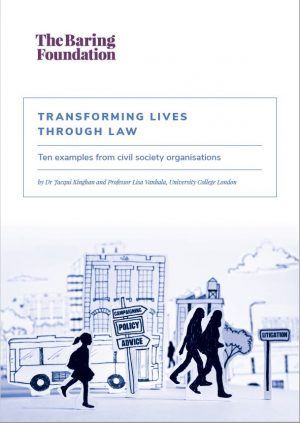We know from longstanding research on access to justice that legal problems can “cluster” so that one unresolved legal problem can lead to many more. We also know that the phenomenon of “referral fatigue” is a concern for individuals who might be endlessly referred from one agency to another in order to resolve a legal problem; such that they give up entirely for want of any meaningful advice and support.
The Families Through Crisis project run by the North East Law Centre aims to counter these issues from an early stage. Working in close collaboration with two other charities, Changing Lives and Advocacy Centre North, their holistic problem-solving approach has had a preventative positive impact for families in Newcastle during challenging times of austerity.
The welfare benefits issue becomes the main point of contact for other services or legal advice because people need to feed their children and keep a roof over their heads.
The project was established after changes brought about by the Legal Aid, Sentencing and Punishment of Offenders Act 2012 took welfare benefits work out of scope for legal aid funding. In addition, Newcastle became one of the first areas of the UK to experience the rollout of Universal Credit. Clare Hurst, the senior solicitor at North East Law Centre explains, “the welfare benefits issue becomes the main point of contact for other services or legal advice because people need to feed their children and keep a roof over their heads.”
Clare and her colleagues could see that the law often wasn’t enough and they needed to work holistically to support clients with other practicalities, such as foodbanks or acquiring furniture, as well as ensuring access to health services. This was especially important in the area of mental health, often a key issue in welfare benefits appeals, where clients can struggle to access appropriate support.
The project is based around an outreach model, offering drop-in sessions at different locations within local communities. Lucy Harrison, a welfare benefits caseworker advising on legal issues, notes that at the beginning of the project attendance was poor because it was seen as “just another service.” She explains that clients “didn’t engage as they didn’t necessarily know the advocate or link worker.” All the partner organisations therefore made the decision to run drop-in sessions together to ensure they built a rapport with clients both individually and collectively.
As a result, Lucy says “the numbers instantly went up – having someone on the spot to say ‘I can help with that, here’s what we’re going to do’ is really important, the relationship is key.” Lucy has noticed that clients often come in before, rather than after, they need to take action on an issue such as a benefits applications or rent arrears, which leads to a much greater likelihood of resolution.
During the drop-in sessions, clients might get a referral for a housing, immigration, employment or healthcare issue. The welfare adviser, advocate and family link worker together adopt a flexible and client-centred approach. Lucy comments: “I think it works because our client journey is not very structured… We say ‘what works for you?’”
Learning has been embedded into the project with each of the partners reflectively reconsidering aspects of the work as it progresses. Clare notes that, “We would listen to the clients to see if something isn’t working for them and then adapt.”
I think it works because our client journey is not very structured. We take an approach that’s suitable for the client – we don’t say you have to come at a particular point. We say what works for you?
This close and flexible way of working has resulted in an increased awareness of rights and entitlements among each of the support workers. It has also led to an improved ability to gather evidence on behalf of clients and to get a “big picture” of their situation.
As Lucy explains, “our partner organisations can write supporting letters for the tribunals, they make contact with the GP and attend appointments with them.” Through close collaborative working they all become aware of one another’s roles and can support each other in resolving clients’ issues.
There is no doubt that early intervention in everyday legal problems has been a challenge in recent years since cuts to legal aid. This project demonstrates how a shared approach that is rooted in local communities can make entitlements to services and support more accessible in practice and help prevent problems escalating in times of crisis.
